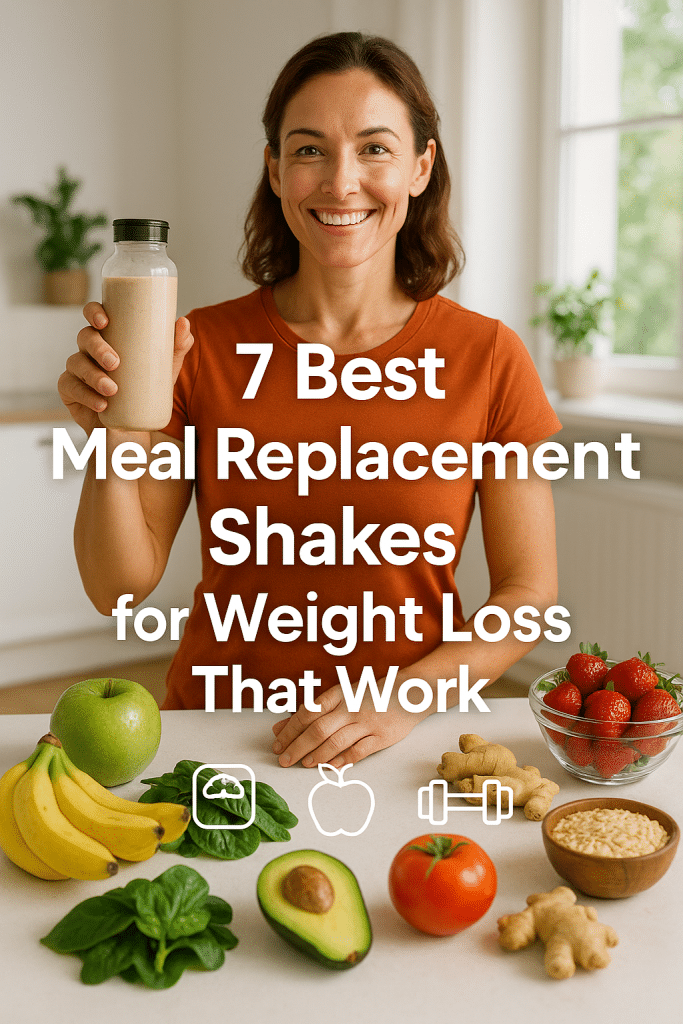In today’s fast-paced world, maintaining a healthy weight can feel like an uphill battle. We juggle work, family, social commitments, and self-care, and sometimes, preparing balanced meals can seem impossible. That’s where meal replacement shakes come in—offering convenience without compromising nutrition. If you’re like me, a health-conscious adult looking for trusted wellness solutions, you might have wondered about the best meal replacement shakes for weight loss. With countless products out there, choosing the right one can be daunting.
In this comprehensive guide, we’ll dive deep into how meal replacement shakes support weight loss, the crucial nutritional components to look for, and criteria for selecting the perfect shake based on your lifestyle. I’ll also reveal detailed reviews of seven top shakes that have earned my trust, backed by expert insights, credible science, and real user feedback. Whether you’re vegan, keto-curious, or simply want to cut calories without losing muscle, this article has you covered. So, let’s fuel your weight loss journey with shakes that work!
Understanding Meal Replacement Shakes: Benefits and Considerations
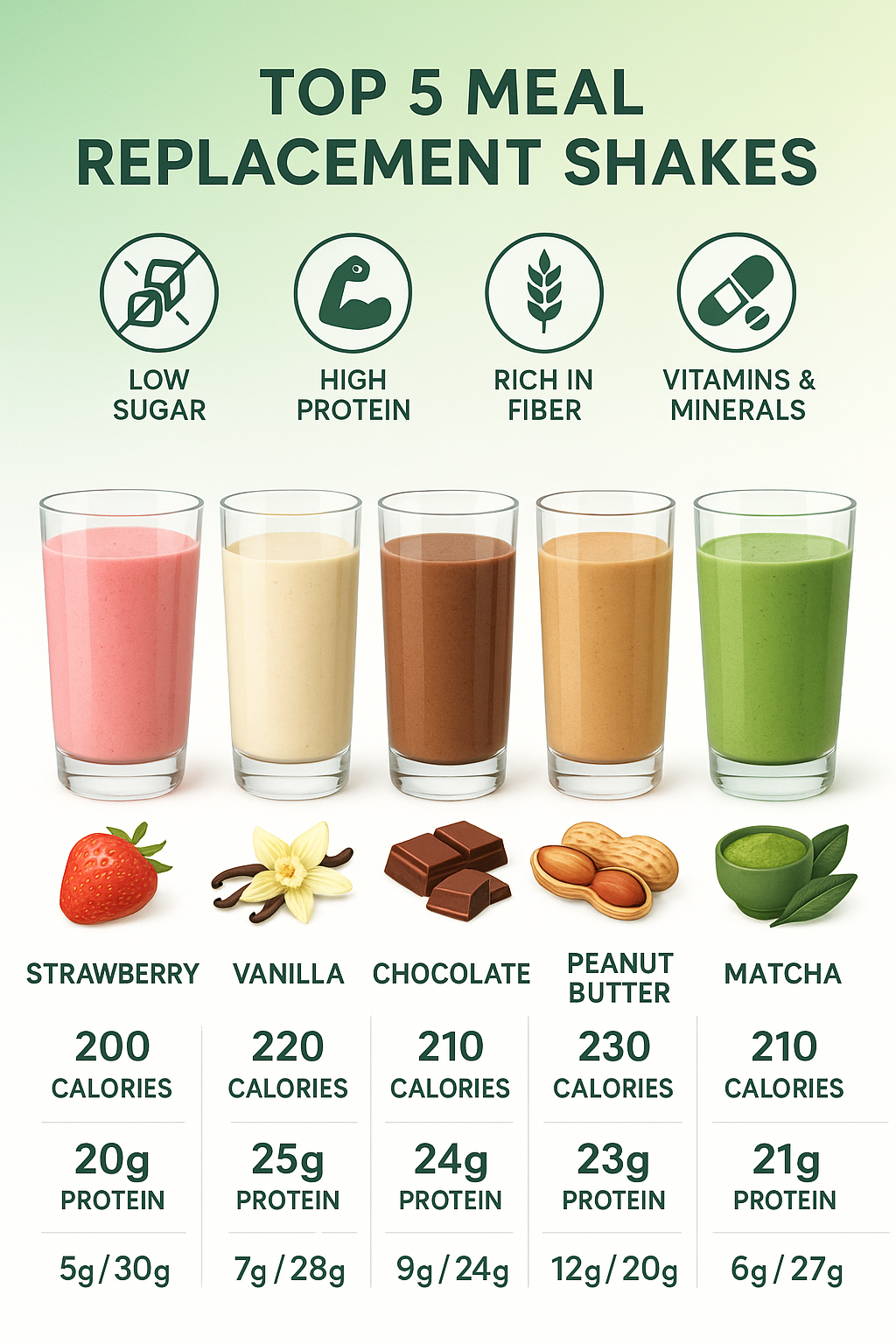
How Meal Replacement Shakes Support Weight Loss
Meal replacement shakes are formulated to provide balanced nutrition in a convenient form. Unlike typical snacks or fast food, they give your body essential nutrients—protein, fiber, healthy fats, vitamins, and minerals—while controlling calorie intake. Appetite control is one of their strongest suits. Because high-quality shakes often contain between 200 to 300 calories per serving and are rich in protein and fiber, they make you feel fuller longer, reducing the temptation to snack on unhealthy foods.
A scientific review published in Nutrients highlights that incorporating meal replacement shakes in calorie-controlled diets consistently improves body composition and aids fat loss when used properly. The sustained satiety effect helps prevent overeating, a major hurdle in weight management. Additionally, shakes that include probiotics and digestive enzymes support gut health, which increasingly is linked to metabolic efficiency and weight regulation.
Key Nutritional Components for Effective Weight Management
Protein Content and Muscle Retention
Protein is king when it comes to weight loss. It not only curbs your hunger but also preserves lean muscle mass while you’re shedding fat. Lean muscle is metabolically active tissue—more muscle mass means a higher resting metabolic rate (RMR). Ideally, meal replacement shakes for weight loss should offer between 20 and 30 grams of high-quality protein per serving.
Plant-based proteins like pea and rice protein are excellent options for those with dietary restrictions or preferences, while whey protein is prized for complete amino acid profiles and fast absorption. For example, Premier Protein Shakes provide 30 grams of whey protein, making it a solid choice for muscle retention during fat loss.
Calorie Control and Fat Loss Strategies
A successful meal replacement shake should be low in calories compared to a typical meal but still nutrient-dense to prevent nutritional deficiencies. Many of the best shakes hover in the range of 100 to 300 calories per serving. This calorie control, combined with adequate protein and fiber, creates a caloric deficit—a proven cornerstone of fat loss.
Additionally, fat content matters. Healthy fats like medium-chain triglycerides (MCTs), found in some shakes like Ka’Chava, promote satiety and may boost metabolism slightly, aiding fat burning.
Importance of Dietary Fiber, Probiotics, and Digestive Enzymes
Fiber helps slow digestion, stabilizes blood sugar levels, and supports a healthy gut microbiome. A shake containing at least 3 to 6 grams of fiber can significantly improve appetite control.
Moreover, probiotics and digestive enzymes can enhance nutrient absorption and ease digestion, reducing bloating and promoting better gut health. Brands like Garden of Life Raw Organic Meal and Ka’Chava include live probiotics and enzymes, taking digestion and nutrient uptake to the next level.
Criteria for Choosing the Best Meal Replacement Shakes for Weight Loss
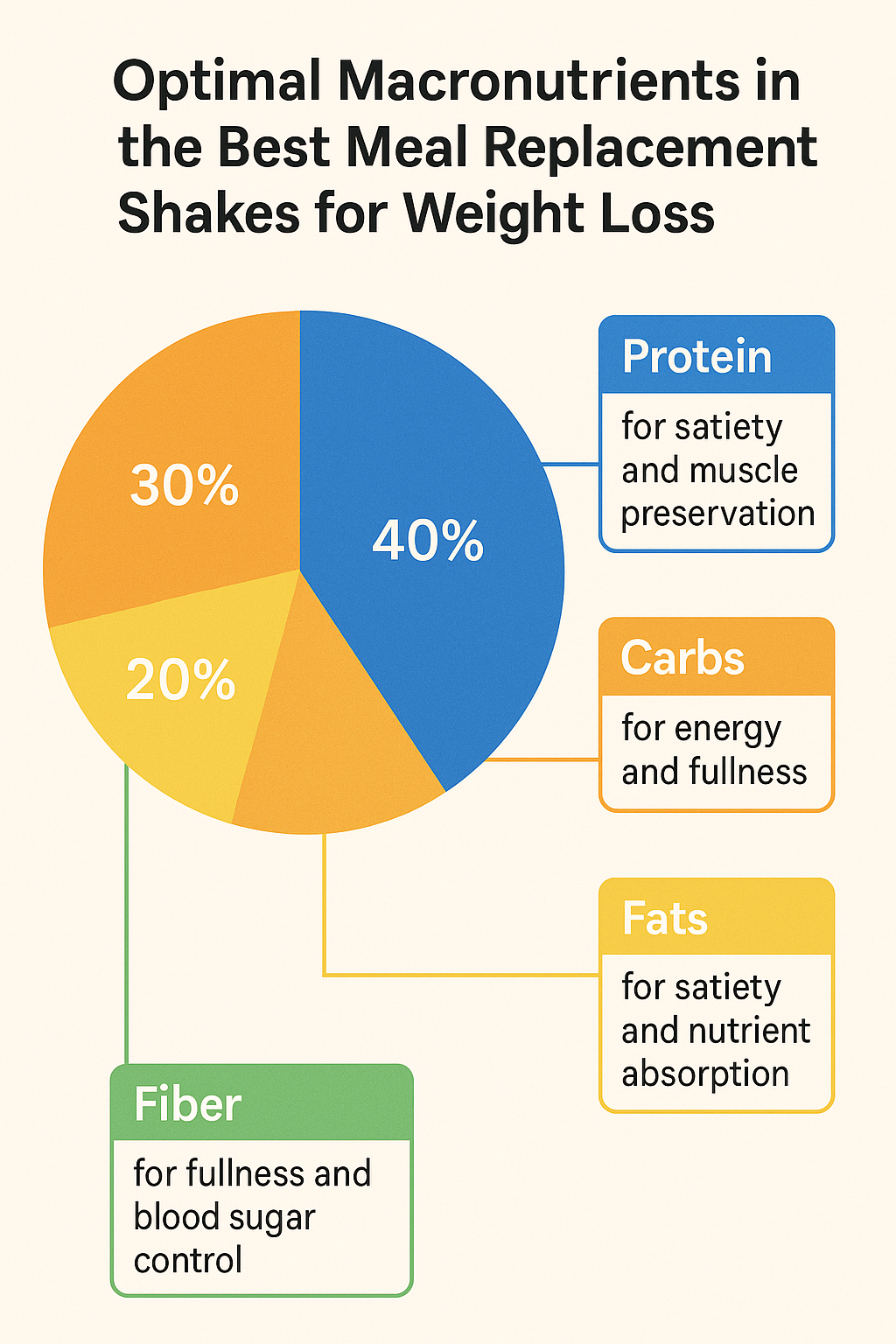
Low-Calorie and Nutrient-Dense Formulations
When searching for the best meal replacement shakes for weight loss, look for products that balance calorie reduction with comprehensive nutrient delivery. Avoid shakes with excessive added sugars or artificial additives, which can cause energy crashes and promote fat storage.
Meal replacement shakes like Exante offer under 120 calories per serving paired with 26 vitamins and minerals, fitting perfectly into a calorie-controlled diet without compromising on essential nutrients.
Plant-Based vs. Whey Protein Options
Choosing between plant-based and whey protein depends on dietary preferences and tolerances. Plant proteins, often combinations of pea, brown rice, and quinoa, suit vegans and those sensitive to dairy. Ora Organic So Lean & So Clean offers an organic, plant-based blend with 21–23 grams of protein and zero artificial ingredients.
Whey protein shakes tend to be absorbed more quickly and may have a more complete amino acid profile, ideal for post-workout consumption. Premier Protein and PhenQ Complete Meal Shake utilize whey protein for its proven benefits in muscle maintenance.
Sugar Content and Use of Sugar Alcohols
Sugar is your enemy in weight loss shakes. It spikes insulin, promotes fat storage, and causes cravings. The best meal replacement shakes either avoid sugar altogether or use natural, low-glycemic sweeteners like stevia or erythritol. Watch for sugar alcohols, which can cause digestive discomfort in some people.
Shakes such as Premier Protein contain only 1 gram of sugar per serving, making them ideal for weight management.
Additional Functional Ingredients: Adaptogens, Vitamins, and Minerals
Some shakes include adaptogens like maca and ginger to help modulate stress, which is linked to weight gain and appetite imbalances. Others pack in antioxidants through superfoods to combat inflammation.
Ka’Chava stands out with its 85+ plant-based ingredients, including adaptogens, greens, omegas, and probiotics. Vitamins and minerals like B vitamins, vitamin C, and magnesium support energy metabolism and overall health, preventing nutrient gaps during calorie restriction.
Flavor Variety and Ease of Use
Let’s face it—taste and convenience matter. A shake you dread drinking won’t last on your shelf. Look for brands offering multiple flavor options, like vanilla, chocolate, or chai, to keep your routine fresh. Also, consider solubility. Some powders clump, which can be off-putting.
Ora Organic, Premier Protein, and Shakeology all receive high marks for flavor variety and smooth mixing. Many come with subscription plans offering delivery convenience.
Detailed Reviews of the 7 Best Meal Replacement Shakes for Weight Loss
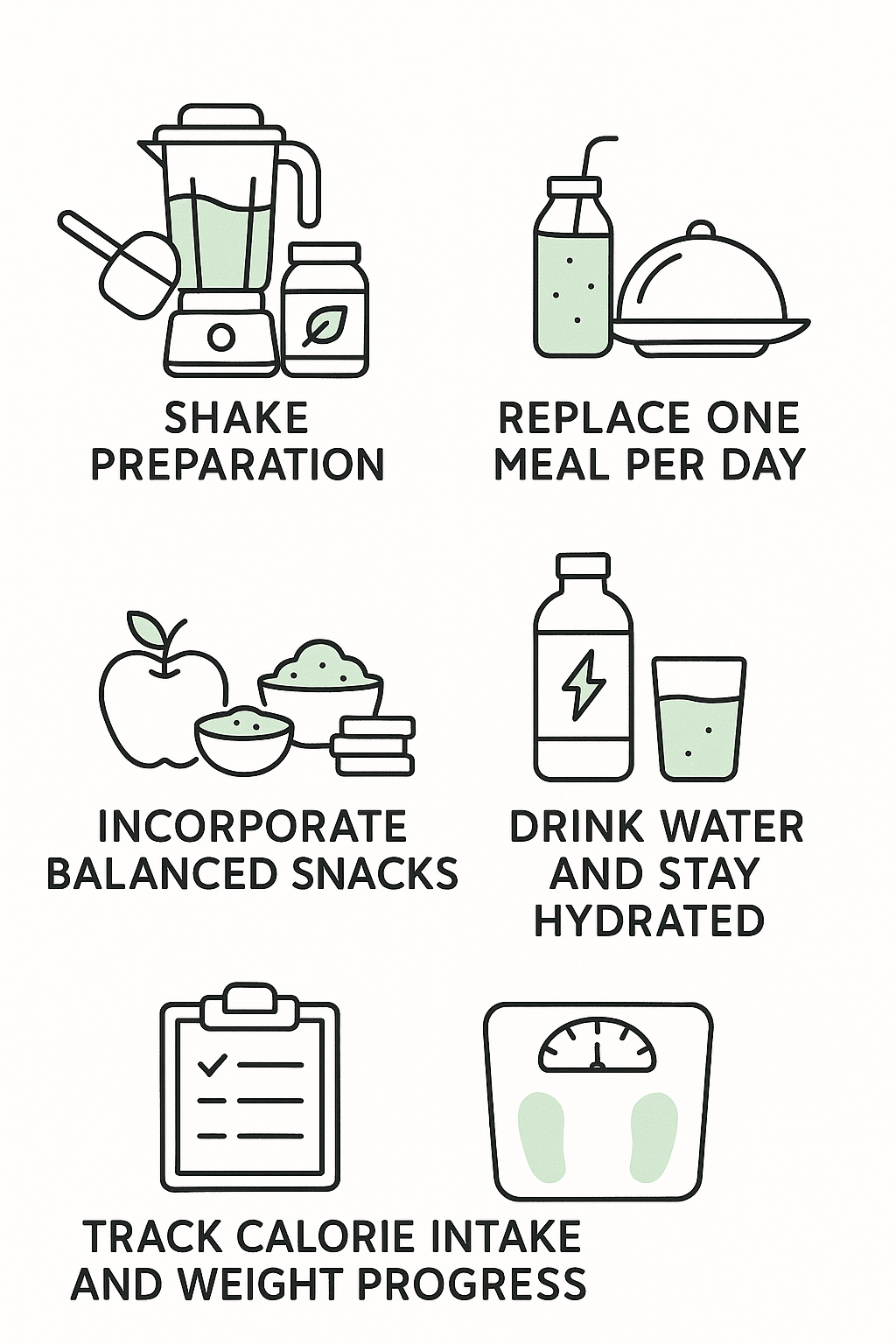
1. Ora Organic So Lean & So Clean: Organic Plant-Based Powerhouse
Features:
– Protein: 21–23g organic pea & rice protein
– Carbs: 0–3 grams net carbs
– Superfoods: 19 organic superfoods including acai, kale, pomegranate
– Digestive Enzymes: Blend included for better absorption
– Free from: artificial flavors, fillers, preservatives
Flavors: Vanilla Chai, Unsweetened, Chocolate
Use Cases: Great for any time of day; blends well in smoothies or baking. Ideal for vegans and those seeking clean, organic options.
Pricing & Availability: Available at Target, Walmart, PlantX, and Nature’s Cleanse (links in references).
Expert Insight: The clean ingredient list and digestive enzymes make it ideal for those with sensitive stomachs looking to avoid bloating common to some plant proteins.
2. Exante Meal Replacement Shake: Clinically Supported and Low-Calorie
Features:
– Calories: Under 120 per serving
– Protein: Balanced with fiber, vitamins, and minerals
– 26 essential vitamins and minerals (covers 25% daily intake)
– Keto-friendly flavors available
Flavors: Chocolate Brownie Keto, Mango & Passion Fruit, Vanilla, Chocolate, Marshmallow Milk Cereal
Purchasing: Via Exante official website with bundle discounts and subscription plans.
Expert Insight: Clinically designed with low calories and rich nutrition, Exante suits those engaged in strict calorie control and variety craving.
3. Premier Protein Shake: Convenient High-Protein Boost
Features:
– Protein: 30g whey per serving
– Sugar: Only 1g
– Vitamins: 25 essential vitamins and minerals
– Ready-to-drink bottles available
Flavors: Chocolate, Vanilla, Caramel, Café Latte, among others
Where to Buy: Premier Protein website, Amazon, Walmart, Walgreens, Kroger
Expert Insight: Among the highest protein concentrations per serving—ideal for muscle retention and appetite control.
4. Ka’Chava Shake: Nutrient-Dense All-in-One Plant-Based Shake
Features:
– Protein: 25g (plant-based including sacha inchi and quinoa)
– Over 85 superfoods, berries, greens, adaptogens (maca, ginger)
– Fat: 7–8g healthy omegas and MCTs
– Prebiotics and probiotics for gut health
Flavors: Chocolate, Vanilla, Coconut Acai, Matcha, Chai
Purchasing: Direct from Ka’Chava website with subscription savings available
Customer Feedback: Praised for taste and comprehensive nutrition without chalkiness typical of plant shakes.
5. Garden of Life Raw Organic Meal: Organic and Probiotic-Rich Option
Features:
– Protein: 20g from 13 sprouted plant sources
– Fiber: 6g per serving
– 44 superfoods plus live probiotics and enzymes
– Certified USDA Organic, Non-GMO, Gluten-Free, Vegan
Flavors: Lightly Sweet (others variant available)
Availability: Garden of Life website, Curated Wellness, Forrest Health, Dr. Alex Rinehart’s shop
Expert Insight: Offers a potent blend of raw organic components supporting digestion and lean muscle in weight management.
6. PhenQ Complete Meal Shake: Appetite Control and Metabolic Support
Features:
– Protein: 16g whey
– Vitamins: 13 key vitamins
– Digestive enzymes included
– Aimed at appetite control and fat loss support
Flavors: Chocolate, Vanilla
Where to Buy: Exclusively on PhenQ official site with 60-day money-back guarantee
Expert Insight: Suitable for those wanting a straightforward whey-based shake with metabolic-enhancing enzymes.
7. Shakeology: Premium Superfood-Loaded Shake for Energy and Craving Reduction
Features:
– Over 70 natural ingredients including whey & pea proteins
– Prebiotics and digestive enzymes
– Vitamins, minerals, antioxidants for overall wellness
– Helps boost energy and reduce cravings
Flavors: Chocolate, Vanilla, Strawberry, Greenberry, Café Latte, Vegan Chocolate, Tropical Strawberry
Purchase: Only from Beachbody official site or authorized coaches
Pricing: Around $129.95 per 24 or 30-serving pack with a 30-day “Bottom of the Bag” guarantee
Expert Insight: Although pricey, Shakeology offers a rich nutritional profile plus a strong community support system, which can enhance adherence to weight loss plans.
Comparing the Best Meal Replacement Shakes: A Nutritional and Practical Overview
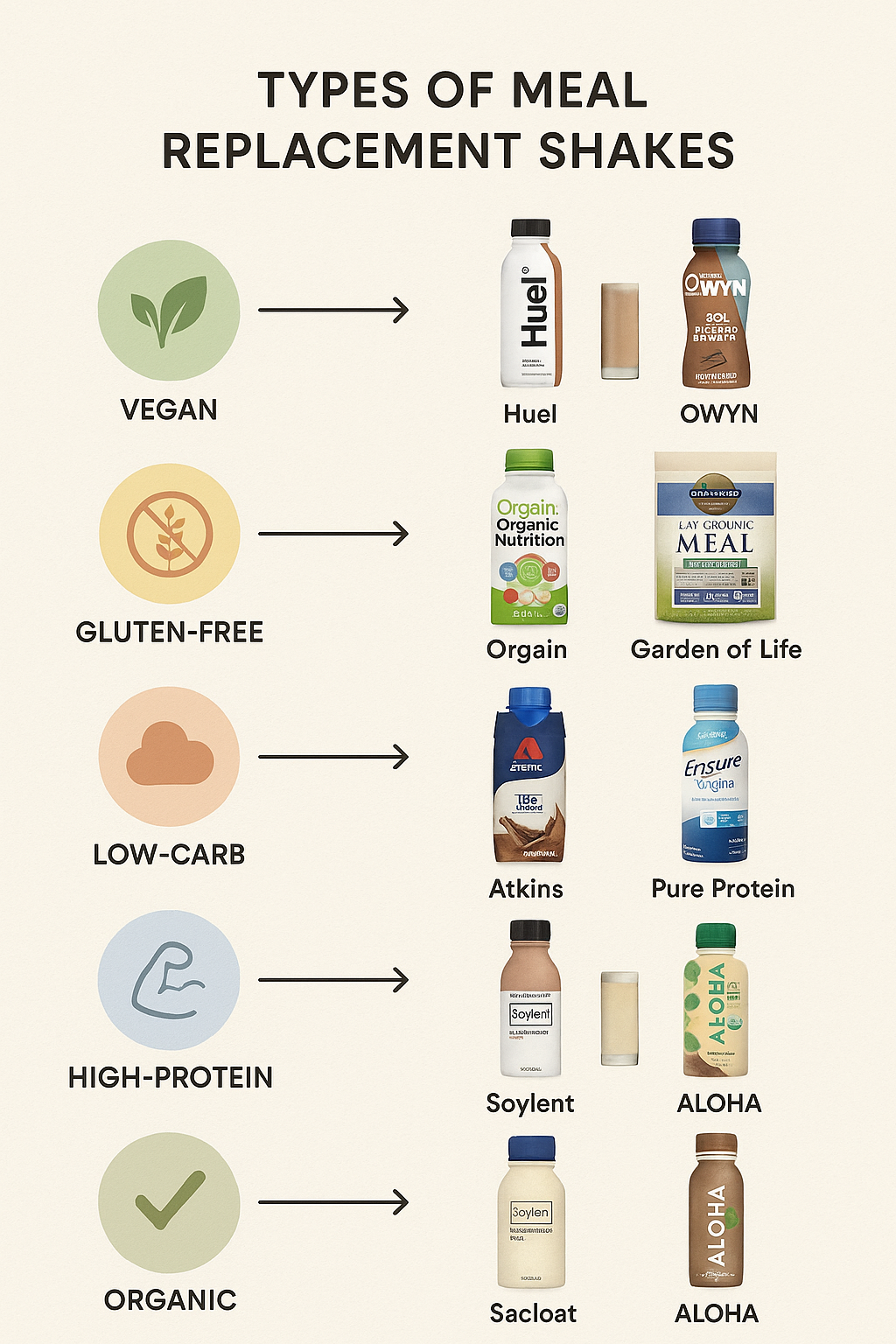
| Shake Brand | Protein (g) | Calories | Fiber (g) | Probiotics/Digestive Enzymes | Sugar (g) | Price Range (per serving) | Best For |
|———————–|————-|———-|———–|——————————|———–|—————————|———————————–|
| Ora Organic | 21–23 | ~120–140 | ~4 | Yes | 0–1 | Moderate | Organic, plant-based, sensitive digestion |
| Exante | ~20-26 | <120 | Varies | Some options | Low | Affordable | Low-calorie, clinically designed |
| Premier Protein | 30 | 160 | 3 | No | 1 | Affordable | High-protein, convenience |
| Ka’Chava | 25 | 240 | 6+ | Yes | Low | Premium | Nutrient-dense, superfoods |
| Garden of Life | 20 | ~130 | 6 | Yes | Low | Premium | Raw organic, probiotic-rich |
| PhenQ Complete Meal | 16 | ~150 | Minimal | Yes | Low | Moderate | Appetite control |
| Shakeology | ~17-20 | 150–160 | 3-6 | Yes | Low | Premium | Superfood blend, wellness focus |
Taste, convenience, and dietary preferences often will guide your final choice beyond nutrition facts.
Incorporating Meal Replacement Shakes into a Balanced Weight Loss Plan
Meal Timing and Frequency
Replacing one or two meals per day with shakes can simplify calorie tracking and often kick-start fat loss. Morning shakes provide energy without heaviness, while post-workout shakes aid muscle recovery. Avoid skipping meals; rather, balance shakes with whole foods for nutrient variety.
Complementary Nutritional Strategies and Exercise
Shakes are tools—not magic bullets. Combining them with a diet rich in vegetables, lean proteins, and healthy fats, alongside regular exercise (both resistance and cardio), ensures optimal weight loss and muscle retention.
Monitoring Progress and Adjusting Intake
Track your weight, body measurements, and energy levels weekly. If hunger persists, consider adding healthy snacks or switching to higher-protein shakes. Consulting a nutritionist helps tailor the plan safely.
Addressing Common Concerns: Allergies, Sustainability, and Long-Term Use
Managing Allergens and Dietary Restrictions
Many shakes cater to common allergies—plant-based options avoid dairy, gluten-free certifications are common. Always read labels carefully. For example, Ora Organic and Garden of Life are vegan and gluten-free.
Environmental Impact of Plant-Based vs. Animal Proteins
Plant-based proteins have a lower environmental footprint, making them appealing for sustainability-conscious consumers. Choosing plant-based shakes like Ka’Chava or Ora Organic supports this ethos.
Balancing Convenience with Whole Food Nutrition
While meal replacement shakes aid convenience, whole foods provide phytochemicals and textures crucial for long-term health. Use shakes as a supplement to a solid diet, not a substitute for all meals.
Unique Perspective: Beyond Weight Loss – Leveraging Meal Replacement Shakes for Holistic Wellness
Supporting Metabolic Health and Gut Microbiome
Probiotics, prebiotics, and fiber support gut bacteria, which influence weight, inflammation, and mood. Shakes rich in these, like Garden of Life and Ka’Chava, promote overall metabolic health.
Enhancing Mental Clarity and Reducing Inflammation
Adaptogens such as maca and ginger help manage stress, improve focus, and may reduce inflammatory markers. These are valuable for emotional eating control and sustained motivation.
Meal Replacements as Tools for Sustainable Lifestyle Changes
By offering nutrition without compromise and time savings, high-quality shakes encourage consistency, helping build lifelong healthy habits beyond temporary diets.
Conclusion: Selecting the Right Meal Replacement Shake for Your Weight Loss Journey
Choosing the best meal replacement shakes for weight loss is a personal decision shaped by your health goals, dietary preferences, lifestyle, and budget. Through this guide, you’ve seen the importance of protein content, calorie control, digestive support, and ingredient quality—essentials for effective and sustainable fat loss.
Whether you lean towards organic and plant-based options like Ora Organic So Lean & So Clean, nutrient-rich superfood blends such as Ka’Chava, clinical low-calorie formulas like Exante, or high-protein convenience with Premier Protein, each shake offers unique benefits.
Remember to integrate shakes thoughtfully into a holistic plan with whole foods, hydration, and regular exercise. Seek professional advice if unsure and listen to your body’s signals. Consistency and balance are your best allies!
Ready to start? Explore the options, experiment with flavors, and fuel your wellness journey confidently. Here’s to your health and achieving those weight loss goals with shakes that truly work!
FAQs About the Best Meal Replacement Shakes for Weight Loss
1. How many meal replacement shakes should I consume daily to lose weight?
Most experts recommend replacing one or two meals with shakes per day while eating balanced whole foods for the other meals. This approach maintains nutrient variety and sustainability.
2. Are plant-based meal replacement shakes effective for weight loss?
Absolutely! Plant-based shakes with complete proteins (pea, rice, quinoa) provide sufficient amino acids and often come with added fiber and antioxidants enhancing weight management.
3. Can meal replacement shakes help with appetite control?
Yes, shakes high in protein and fiber promote satiety, reducing cravings and overeating. Those with added digestive enzymes or probiotics may further support this effect by optimizing digestion.
4. Are there meal replacement shakes suitable for people with gluten intolerance?
Yes, many shakes like Garden of Life Raw Organic Meal and Ora Organic are certified gluten-free. Always check product labels for allergen information.
5. How do meal replacement shakes compare with whole food meals for sustainable weight loss?
Shakes are convenient and effective tools, especially for controlling calories and nutrients. However, whole food meals provide broader variety of nutrients and should complement shakes for long-term wellness.
Quick Takeaways / Key Points
- Protein content of 20-30g per serving is crucial for muscle retention and appetite suppression during weight loss.
- Shakes with low-calorie, nutrient-dense formulations help create the necessary caloric deficit without nutrient deficiencies.
- Fiber, probiotics, and digestive enzymes enhance digestion, satiety, and gut health, supporting weight management.
- Consider your diet preferences: plant-based vs whey protein, sugar content, and flavor variety are important for adherence.
- The reviewed shakes range from affordable, clinical options (Exante) to premium superfood blends (Shakeology, Ka’Chava), catering to diverse needs.
- Incorporate shakes within a balanced diet and regular exercise routine for sustainable results.
- Monitor your body’s response and adjust intake or flavors accordingly for long-term success.
For more information and to purchase these shakes, the official brand websites linked throughout this article provide authentic products and detailed nutrition info. Here’s to a healthier, energized, and more confident you on your weight loss journey!

